Intel Core i5-8600K Review: Coffee Lake's Jolting Value
Why you can trust Tom's Hardware
Conclusion
Intel's Core processors were long overdue for an infusion of extra execution resources. Two more cores help the Core i5-8600K put serious distance between Kaby Lake in threaded workloads, while aggressive Turbo Boost binning ensures you don't lose performance at any given utilization level. In fact, the six-core -8600K generally offers higher clocks than the -7600K in real-world tasks, despite Intel's lower base frequency specification.
The Core i5-8600K benefits gaming performance in a quantifiable way. We use a geometric mean of 99th percentile frame times, a good indicator of smoothness, converted into an FPS measurement. Five of the games we test were released in 2016, and five are older (2014/2015). Extra cores could enable more performance as software evolves, so we also include a chart with newer games that thoroughly utilize available host processing resources. We also have price-to-performance charts that include extra platform costs. For the models that don't come with a bundled cooler, we add an extra $25 for a basic heat sink. We also add $20 if overclocking requires a more expensive motherboard (as is the case for Z370).
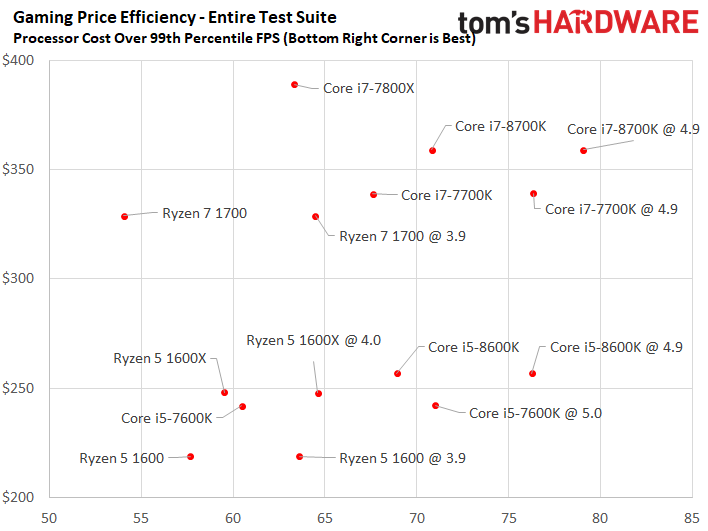
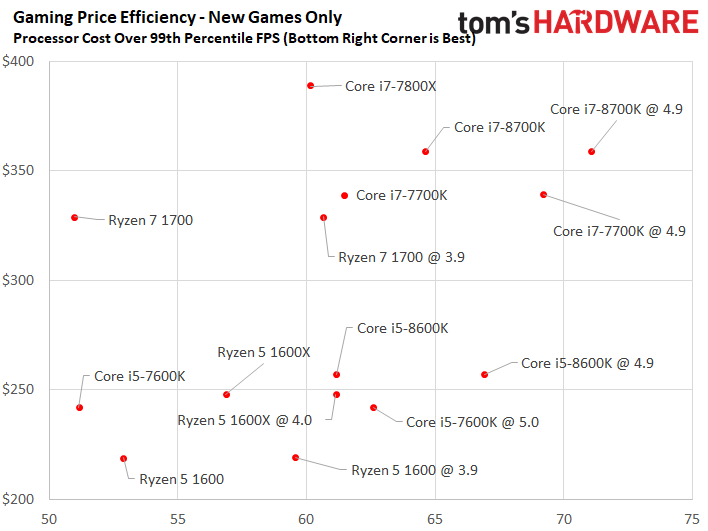
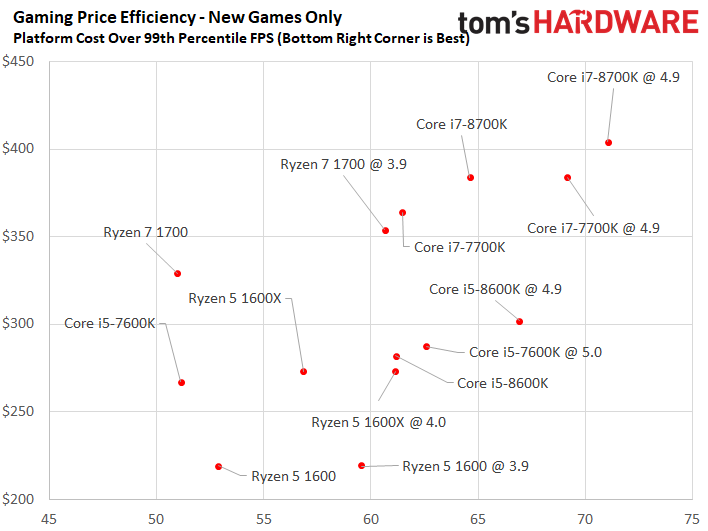
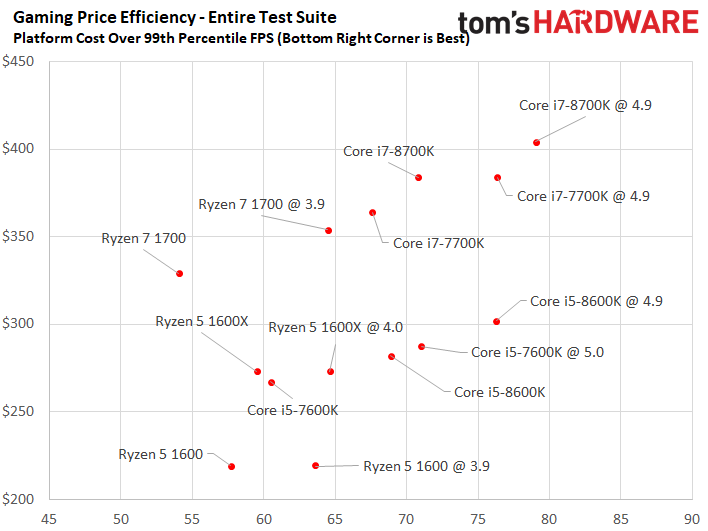
Officially, Core i5-8600K sells for $15 more than its Kaby Lake predecessor (though street pricing currently has it +$40). The -8600K does, however, deliver more performance in most games. It even matches the Core i7-7700K, typically. AMD's Ryzen 5 1600X offers solid performance for enthusiasts on a budget, but it tends to trail the stock Core i5. And that's after overclocking.
Ryzen 7 1700 might be a more compelling option thanks to its eight cores and 16 threads, particularly if you run a lot of rendering/encoding tasks. A price point around $300 comes awful close to Core i5-8600K's current $280. And when you factor in lower-cost AMD motherboards and a bundled Wraith Spire heat sink/fan, an unlocked Coffee Lake chip quickly becomes more expensive. After all, it doesn't include cooling at all, while overclocking necessitates a premium Z370-based platform.
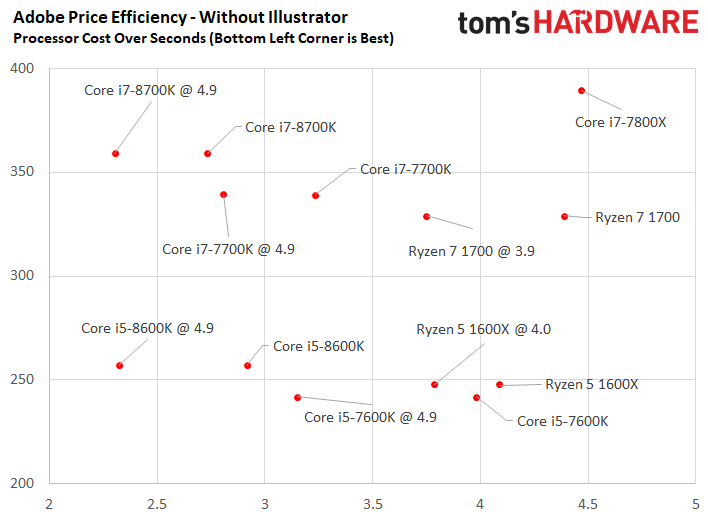
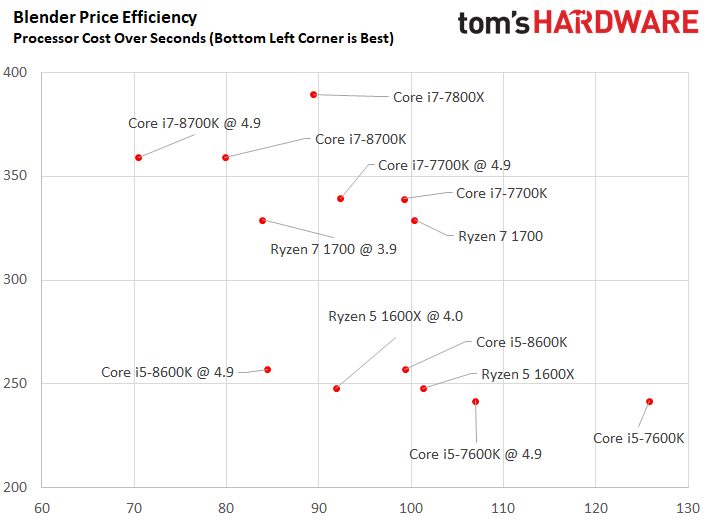
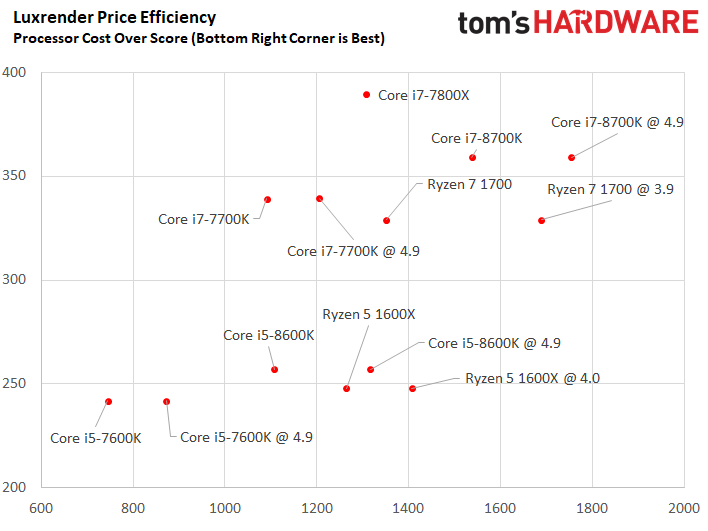
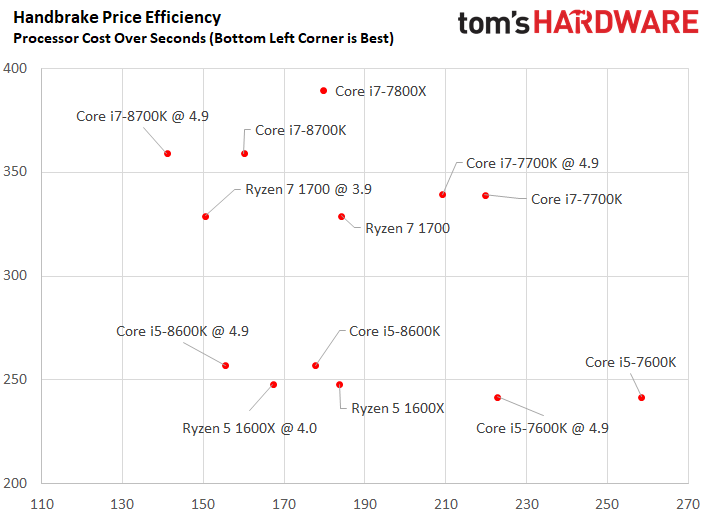
Overall, Intel's Core i5-8600K offers balanced performance in a wide range of workloads. Right now, availability is an issue. Provided you can find one, though, the -8600K delivers an unmatched gaming experience at its price.
For a bit of perspective, Core i5-8600K often provides similar gaming frame rates as the previous-gen Core i7-7700K, and it's incredibly competitive in productivity workloads. However, you can buy it for $60 less. That's an incredible jump. We stop short of saying Core i5-8600K represents the best gaming value because we haven't reviewed the multiplier-locked models yet. But -8600K certainly provides the best gaming value of the processors we've tested so far. That means you can build a gaming PC with GeForce GTX 1080 Ti or Radeon RX Vega 64 and not worry about host processing bottlenecks.
The Core i5-8600K also wields more horsepower for heavy-lifting, improving the results you'll see in demanding productivity workloads. AMD does well in that category as well though, so keep your eyes out for deals!
Get Tom's Hardware's best news and in-depth reviews, straight to your inbox.
MORE: Best CPUs
MORE: Intel & AMD Processor Hierarchy
MORE: All CPUs Content
Current page: Conclusion
Prev Page Overclocking, Power Consumption & Temperatures
Paul Alcorn is the Editor-in-Chief for Tom's Hardware US. He also writes news and reviews on CPUs, storage, and enterprise hardware.
-
logainofhades Great CPU, but the overall platform cost is a bit of a turn off, for me. I'd rather get a 1600, and a B350 board, to allow for a better GPU, if buying new. As stated in the review, even a 1700, with a less expensive board, is a very compelling option.Reply
-
AS118 Seems like a good product, but I'd like to see what the 8600 and 8500 non-k offers, and perhaps next year with the B360 boards that give them a more budget "locked cpu" option.Reply
I also feel that the availability will be low for Coffee Lake until the end of this year, particularly throughout the holiday season. Due to that concern (as well as the total cost of platform ownership) I think that Ryzen with its 1600 and 1700 CPU's along with the 1600x will be the value kings this year, with Coffee Lake not hitting it's stride until early next year.
The fact that AMD's stuff doesn't have the same availability issues makes it a strong contender, imho, although Black Friday and Christmas sales will also like make Kaby Lake (and even Sky Lake) stuff at clearance prices appealing too, despite the lack of cores you'll find in Ryzen and now Coffee Lake. -
almostdecent Since the chart shows the i5-8600k and the i5-8600K@4.9GHz at the same $260, I presume that means you achieved the overclock with the stock cooler.Reply -
ammaross It's kind of disappointing to see so many benchmarks where an i5 does as well or better than it's i7 counterpart. It just shows how poorly threaded some of these applications really are and almost necessitates running two benchmarks simultaneously to really judge the merit of these multi-core CPUs. Maybe run the photoshop test while rendering with After Effects or run a game benchmark while doing CPU h.265 handbrake.Reply -
almostdecent It is worth mentioning that this is essentially a paper launch at the moment, since none of the Coffee Lake processors are available anywhere.Reply
http://www.nowinstock.net/computers/processors/intel/
and the rare place that has any, such as Microcenter, have gouging prices. Such as selling the plain i7-8700 (not the K version) with an MSRP of $300 for sale for $429.
http://www.microcenter.com/product/486087/Core_i7-8700_Coffee_Lake_32_GHz_LGA_1151_Boxed_Processor -
InvalidError Reply
On September 20, Intel responded to a story about yet another 10nm schedule slip by saying that Cannon Lake will begin shipping in limited quantities to some laptop manufacturers with production ramping up in 1H2018. Limited Coffee Lake volume could be due to Intel deciding to upgrade production lines to 10nm for Cannon Lake instead of 14++.20281291 said:I also feel that the availability will be low for Coffee Lake until the end of this year, particularly throughout the holiday season. -
TJ Hooker Reply
Not sure if you were being sarcastic, but the 8600K doesn't have a stock cooler.20281420 said:Since the chart shows the i5-8600k and the i5-8600K@4.9GHz at the same $260, I presume that means you achieved the overclock with the stock cooler.
There are two different sets of graphs, one that looks at CPU only costs and the other that considers CPU, mobo, and cooler costs. In the latter, the 8600K at 4.9GHz is clearly shown to cost more.
-
InvalidError Reply
Intel hasn't included a stock HSF with their unlocked CPUs since Skylake so on top of paying more for the unlock, you also get shafted by the price of a stock cooler which you no longer get on top of it. You need an aftermarket cooler for both stock and OC.20281420 said:Since the chart shows the i5-8600k and the i5-8600K@4.9GHz at the same $260, I presume that means you achieved the overclock with the stock cooler.
Same thing with AMD's Ryzen nnnnX CPUs. -
YoAndy Reply20281216 said:Great CPU, but the overall platform cost is a bit of a turn off, for me. I'd rather get a 1600, and a B350 board, to allow for a better GPU, if buying new. As stated in the review, even a 1700, with a less expensive board, is a very compelling option.
A better GPU?//Why would you do that. at 1080p Ryzen will (bottleneck) hold back powerful GPU's, It won't give you equal performance. I bought a Ryzen for pure gaming and i ended up selling it.. -
acosta.87 Reply20281216 said:Great CPU, but the overall platform cost is a bit of a turn off, for me. I'd rather get a 1600, and a B350 board, to allow for a better GPU, if buying new. As stated in the review, even a 1700, with a less expensive board, is a very compelling option.
B350 VRM's are pretty low quality for any sort of OC unless it's a mild one so for me that's a no go. If you're primarily into gaming then the 1600 has nothing on the i5, it simply trails it whether at stock settings or OC'd and even at productivity it beats a 1600 Ryzen processors in most task even with a 6 thread deficit so it's a pretty good investment overall.